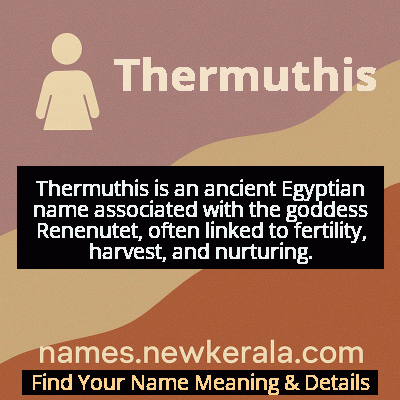Thermuthis Name Meaning & Details
Origin, Popularity, Numerology Analysis & Name Meaning of Thermuthis
Discover the origin, meaning, and cultural significance of the name THERMUTHIS. Delve into its historical roots and explore the lasting impact it has had on communities and traditions.
Name
Thermuthis
Gender
Female
Origin
Egyptian
Lucky Number
6
Meaning of the Name - Thermuthis
Thermuthis is an ancient Egyptian name associated with the goddess Renenutet, often linked to fertility, harvest, and nurturing.
Thermuthis - Complete Numerology Analysis
Your Numerology Number
Based on Pythagorean Numerology System
Ruling Planet
Venus
Positive Nature
Harmonious, responsible, caring, and artistic.
Negative Traits
Overly idealistic, superficial, possessive, or jealous.
Lucky Colours
Pink, turquoise.
Lucky Days
Friday.
Lucky Stones
Diamond, turquoise.
Harmony Numbers
2, 3, 9.
Best Suited Professions
Artists, musicians, teachers, healthcare workers.
What People Like About You
Warmth, nurturing nature, artistic flair.
Famous People Named Thermuthis
Thermuthis
Mythological Goddess
Ancient Egyptian deity of fertility, harvest, and child protection
Thermuthis
Biblical Figure
Identified in some traditions as the Egyptian princess who adopted Moses
Thermuthis
Religious Icon
Syncretic figure blending Egyptian and Hellenistic religious traditions
Name Variations & International Equivalents
Click on blue names to explore their detailed meanings. Gray names with will be available soon.
Cultural & Historical Significance
Extended Personality Analysis
The name Thermuthis evokes personality characteristics deeply rooted in its mythological origins as a goddess of nourishment and protection. Individuals connected to this name typically exhibit strong nurturing qualities, demonstrating exceptional care for the growth and development of others. They possess what might be called 'agricultural patience'—the understanding that meaningful growth happens gradually and requires consistent attention. Like the harvest cycles their namesake governed, they appreciate natural rhythms and timing in relationships and projects. These individuals often serve as protective figures in their communities, watching over vulnerable members and ensuring collective wellbeing. The snake symbolism associated with Thermuthis adds layers of transformation and wisdom to their character—they're often people who guide others through significant life changes, helping them shed old patterns and embrace new beginnings. While gentle in their nurturing approach, they can display formidable protective instincts when those they care for are threatened. Their strength lies in their ability to combine practical care with spiritual insight, making them natural healers, teachers, or community leaders. The duality of their nature—both gentle nurturer and powerful protector—makes them complex, multifaceted individuals who understand that true care sometimes requires both softness and strength.
Modern Usage & Popularity
In contemporary naming practices, Thermuthis occupies an extremely specialized niche, appealing primarily to scholars of Egyptian history, mythology enthusiasts, and parents seeking names with profound historical resonance. The name's rarity stems from its specific cultural references and relatively complex pronunciation for modern English speakers. However, it has seen a slight resurgence in recent years as part of the broader trend toward mythological and historically significant names. Within neo-pagan and Kemetic reconstructionist communities, Thermuthis is sometimes chosen to honor the ancient goddess and connect children to Egyptian spiritual traditions. Academic contexts provide another modern usage—the name appears in historical fiction, scholarly works about Egyptian religion, and comparative mythology studies. The digital age has facilitated renewed interest in such obscure mythological names through online communities dedicated to ancient history and alternative naming practices. While Thermuthis is unlikely to become a mainstream name, its continued use in these specialized contexts ensures its preservation as part of our cultural heritage. The name's modern appeal lies in its combination of feminine power, historical depth, and unique sound—qualities valued by parents seeking distinctive names with meaningful backgrounds beyond contemporary trends.
Symbolic & Spiritual Meanings
Thermuthis embodies profound symbolic meanings that transcend her original Egyptian context to speak to universal human experiences. As a harvest goddess, she symbolizes the cyclical nature of life—planting, growth, harvest, and renewal—representing both the tangible abundance of the earth and the metaphorical harvest of personal achievements. Her association with child protection and nursing extends this symbolism to include the nurturing of potential and the careful cultivation of new life in all its forms. The snake imagery connected to Thermuthis carries multiple symbolic layers: transformation through shedding skin, wisdom through ancient knowledge, and protection through defensive capability. This combination makes her a powerful symbol of integrated strength—the ability to be both nurturing and formidable, gentle and powerful. The historical transformation of her identity from Renenet to Thermuthis symbolizes cultural adaptation and the way spiritual concepts evolve through cross-cultural exchange. Metaphorically, Thermuthis represents the sacred responsibility of stewardship—whether of land, children, communities, or ideas. She symbolizes the understanding that true abundance comes not from mere accumulation but from careful, respectful cultivation and the wisdom to recognize that all growth follows natural cycles beyond human control. In modern symbolic terms, Thermuthis represents ecological consciousness, mindful nurturing, and the recognition that protection and growth are complementary rather than contradictory forces.

